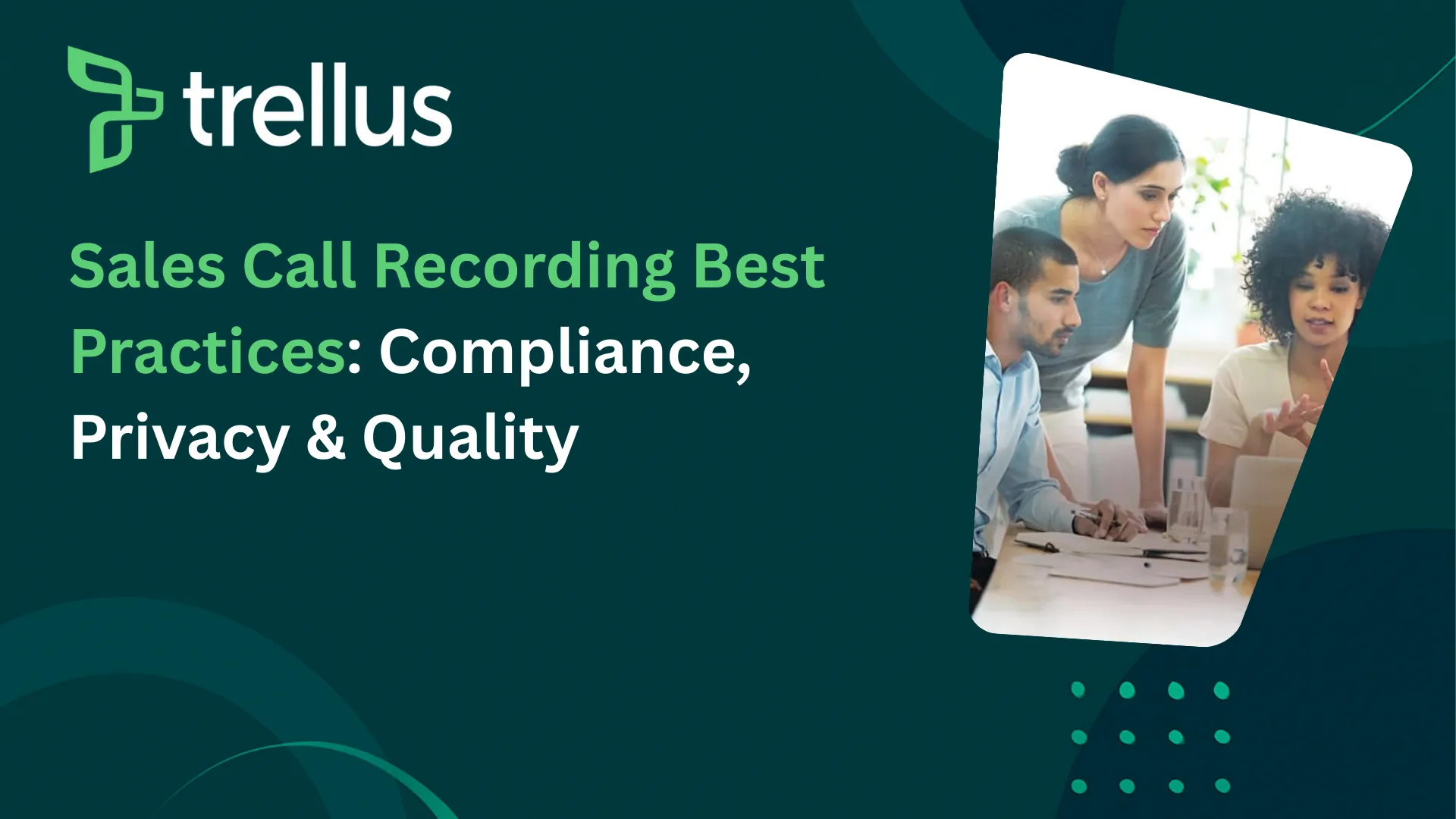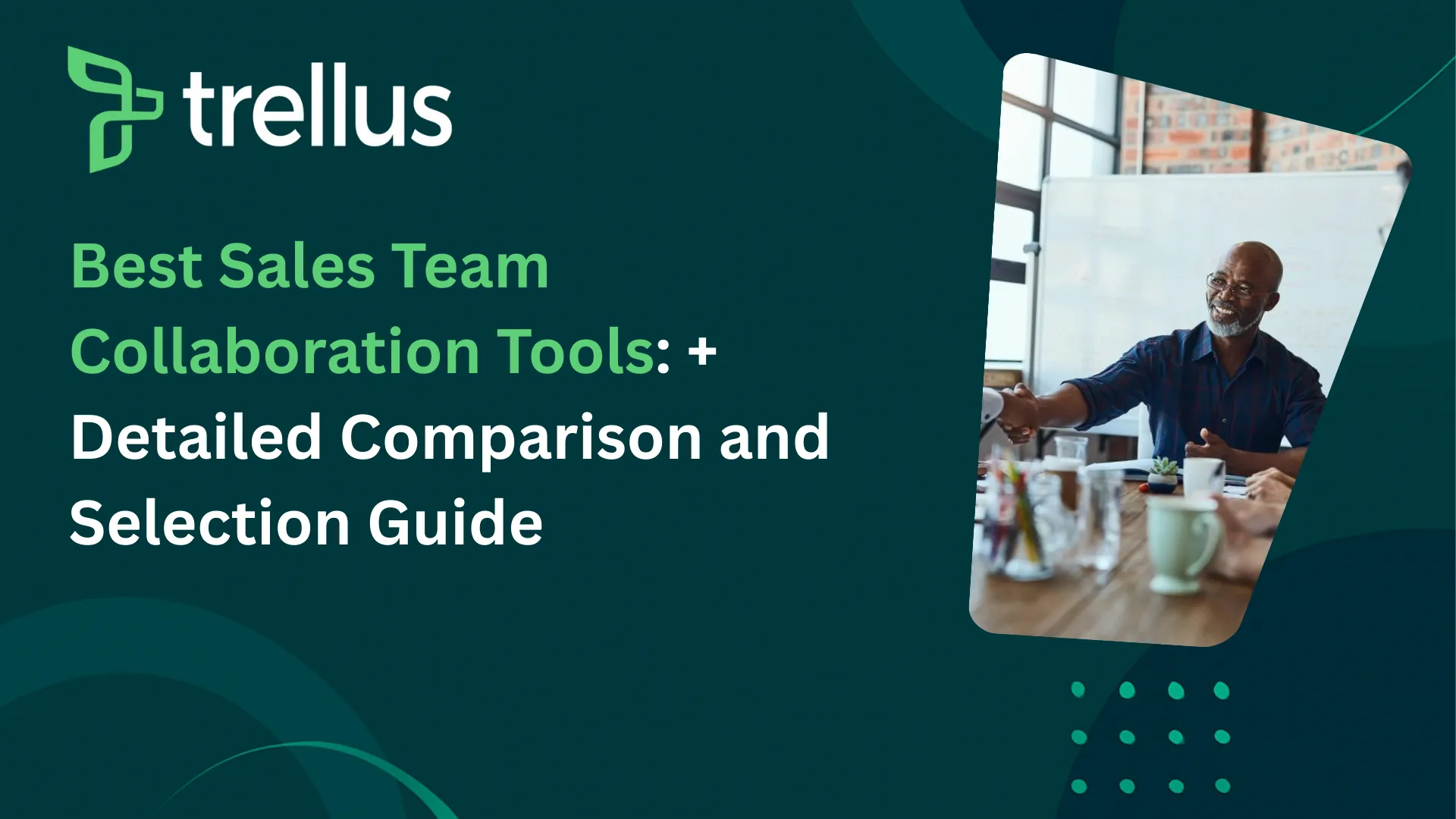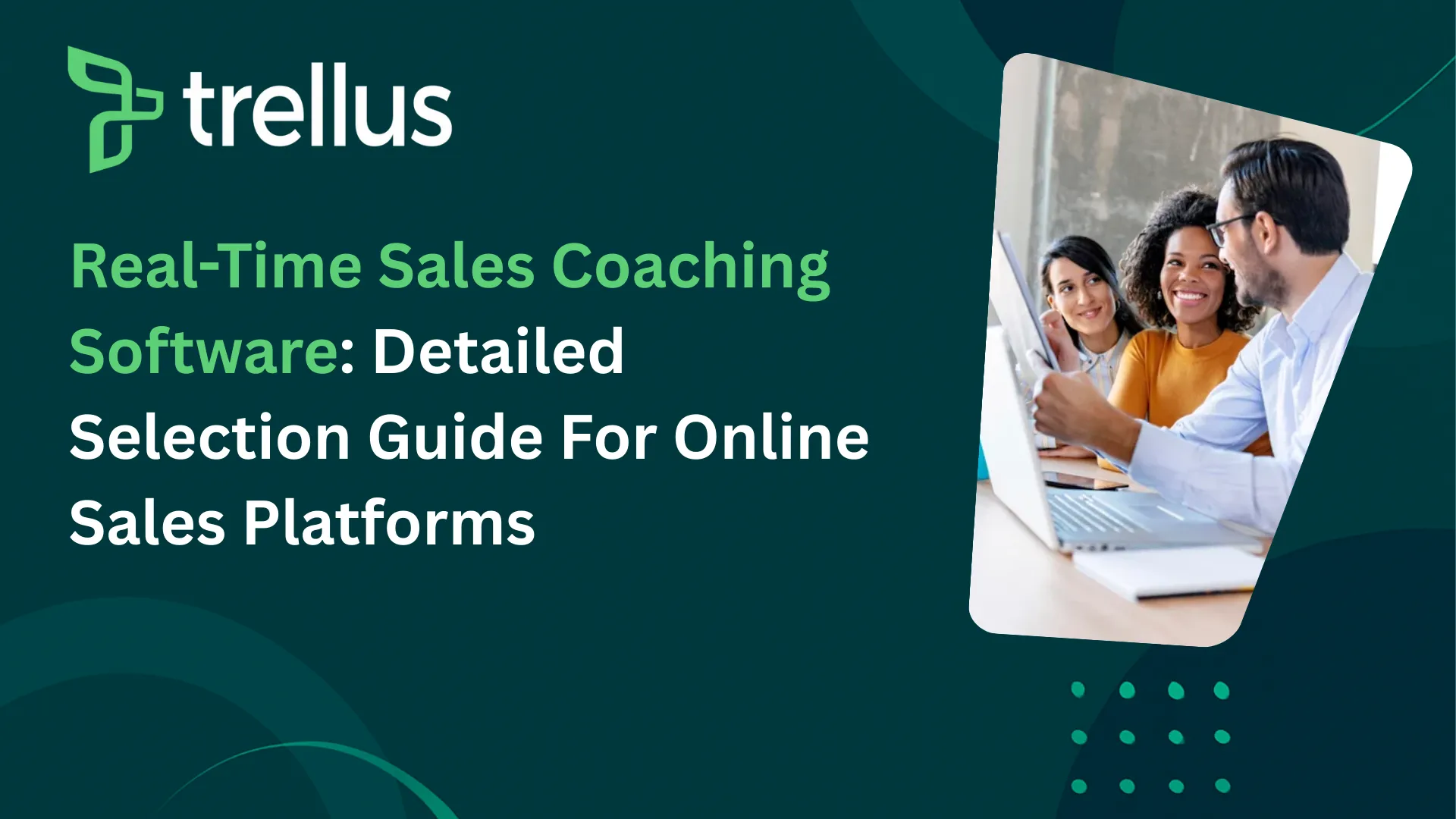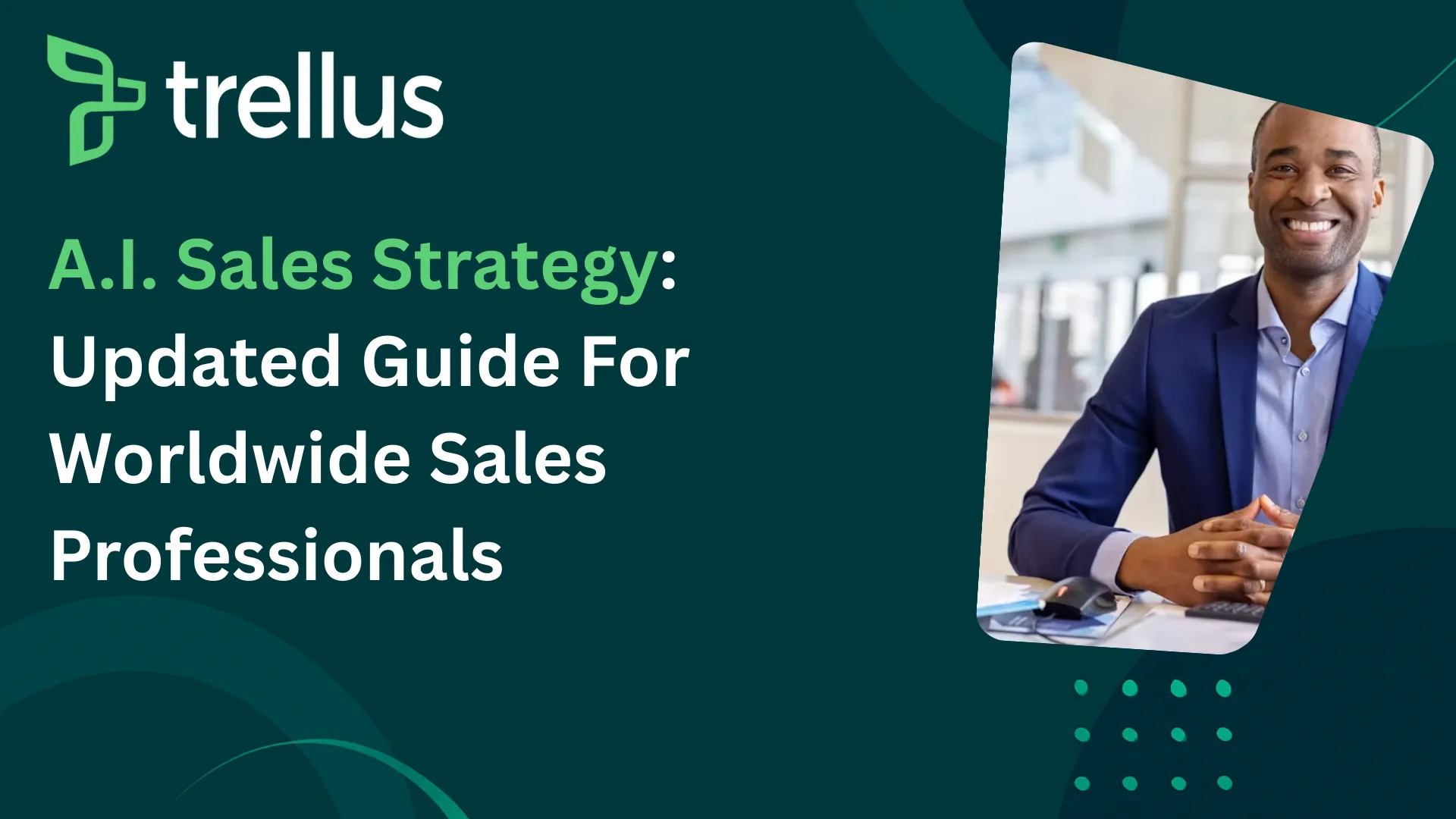
Our Top Picks


Thanks to the way technology has advanced and offered tons of tools, the past two years have more or less rewritten the narrative of how sales are made.
We’ve got this new fad, called generative AI, which created the first spark of excitement.
How so?
The “GEO experience,” as sales and marketing experts like to call it, significantly promises to cut down on or completely eliminate repetitive work and help sales teams move faster.
That also means that more time can be spent on things that matter - i.e. conversions and goal completion, which, to be honest, is pretty tough for people in the sales industry.
Coming back to the topic, agentic AI has already stepped up the game, bringing self-directed intelligence that can follow complex workflows, set its own goals, and even learn along the way.
It all sounds like the future, and in many ways, it is. But here’s the catch: while sales artificial intelligence has already proven it can move the needle in areas like productivity and customer engagement, most companies haven’t figured out how to unlock its full value at scale.
As a result, we can see that the upside is enormous because artificial intelligence in sales has the power to shorten the sales conversion cycle, double the amount of time reps spend actually selling, and boost win rates by more than 30%. Yet, meaningful results are still rare.
The challenge isn’t whether AI can work in sales. It’s whether companies are rethinking their sales processes deeply enough to allow AI to shine.
As of right now, there are far too many sales organizations that are adding AI tools into broken workflows, hoping for miracles, and ending up with micro-productivity gains instead of big transformations.
The truth is, however the way AI is changing sales depends less on the tech itself and more on how leaders restructure the funnel, the data, and the culture around selling.
What Is an AI Sales Strategy?
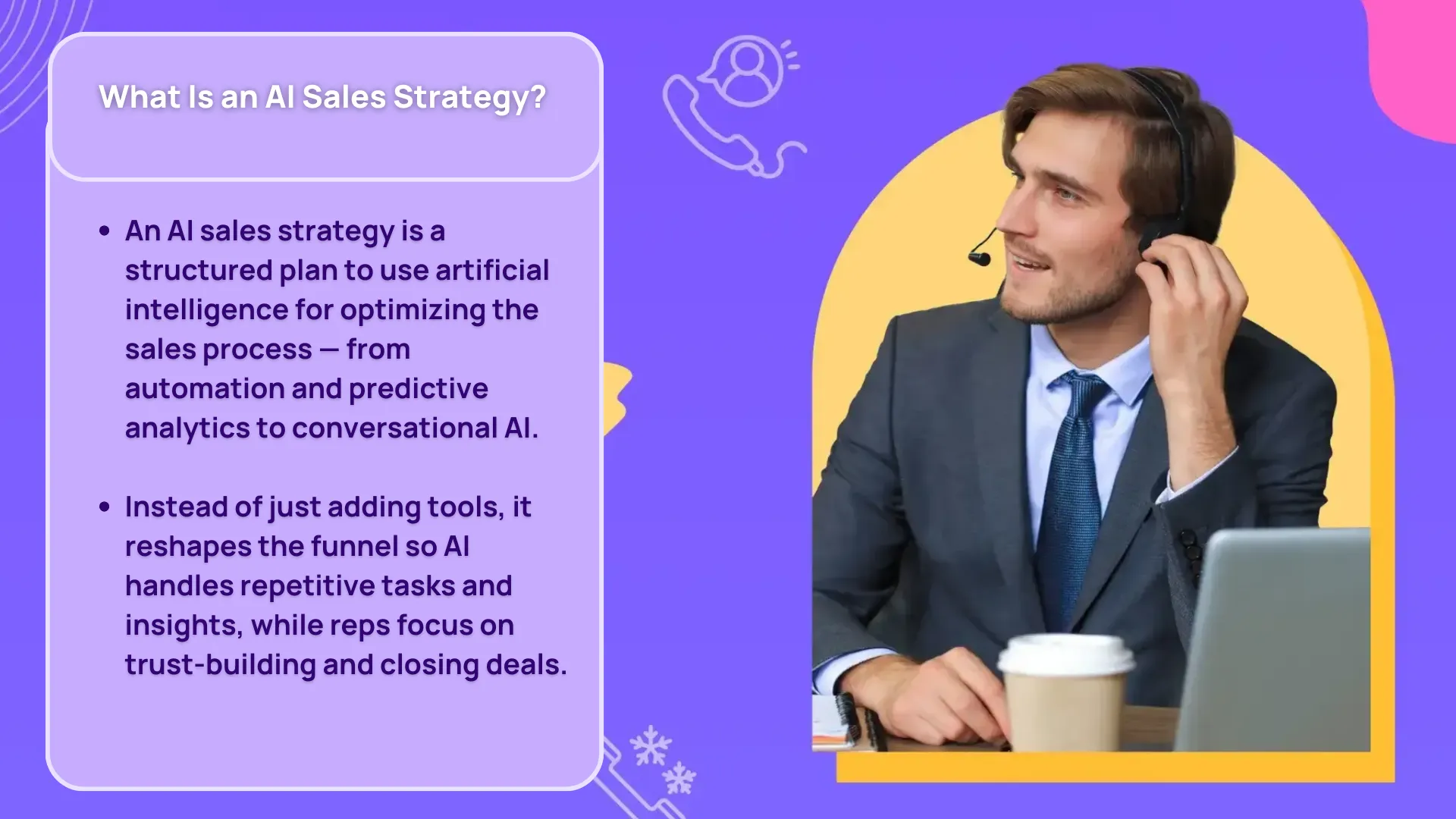
An AI sales strategy is a deliberate plan for using artificial intelligence to optimize every stage of the selling journey.
From an expert’s point of view, as in, someone who implements AI for companies, every other day, it’s not about buying a chatbot or plugging in an AI tool here and there.
Anyone can do that by downloading the plugin, or directly integrating it through some online resource.
On the contrary, precision is what you’re looking for.
That means it’s about redesigning the funnel so that AI can handle what machines are best at—automation, data analysis, real-time insights, and predictive lead scoring—while freeing sales reps to focus on what humans are best at: building trust, persuading prospects, and closing deals.
This strategy combines multiple layers of technology.
For example, conversational AI for sales reps helps during live interactions, predictive analytics identifies where opportunities are most promising, and AI-driven sales automation handles the time-consuming work of data entry, after-call notes, or CRM updates. Together, these elements create an ecosystem where the sales process is faster, smarter, and more aligned with customer expectations.
When done or implemented the right way through personalization, an AI sales strategy is not just about efficiency; it’s about sales process optimization—reshaping the way selling happens so reps spend more time selling and less time shuffling between tools and admin tasks.
How AI Is Changing Sales?
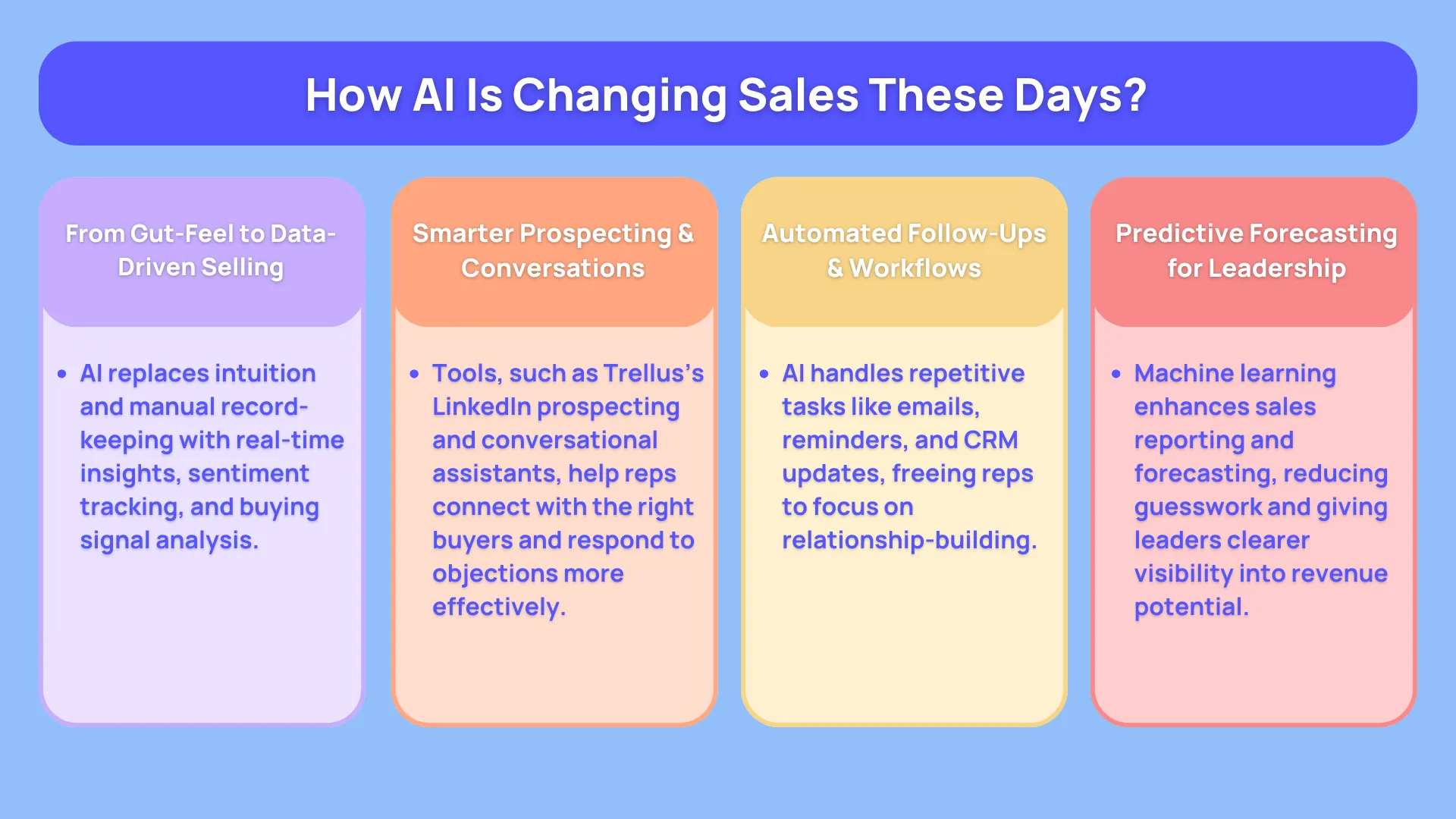
Back in “good old days,” when automation wasn’t that common, the traditional approach to bringing in more sales relied on intuition, manual record-keeping, and repetitive outreach to hit quota.
The best sellers succeeded because of hustle and people skills, while managers tried to keep everyone else on track through spreadsheets, endless coaching sessions, and CRM reminders.
Today, AI has turned this on its head. Sales artificial intelligence can now listen to customer conversations, track sentiment, analyze buying signals, and recommend the next best action—all in real time.
A rep who once had to spend hours preparing for a call can now have an artificial intelligence sales assistant whispering in their ear with instant insights about the customer, their objections, and the right pitch to use.
But the best thing to come out of this whole experience is someone who has that hustle attitude and the perfect blend of people skills. Imagine a sales person who can strike up a conversation. He or she is a veteran, and is currently using a bunch of customized ai sales tools, which save the rep tons of time on manual tasks.
The amount of conversions and sales that person would be bringing in would be enormous. Multiply it with whatever number your team size is, given that everyone’s been with you for a few years now, and they know the lay of the land. You’re looking at substantial revenue, profit margin and optimized workflow.
In terms of impact, the current sales funnel is looking like this:
- Prospecting: AI-powered sales tools, such as LinkedIn Superhuman in Trellus helps reps to categorically get in touch with prospects, escalating conversations that matter the most.
Besides that, Trellus has bunch of other tools based on the way it integrates with CRMs these days. You’re looking at full scale research done within minutes, automated workflows and tons of other things.
- Conversations: Conversational AI for sales reps can handle plenty of things, such as cuing in tips based on ongoing real time calls, so that reps can have stronger comebacks to cold calling objections.
- Smart Follow-ups: AI-driven sales automation makes sure emails, reminders, and account updates happen without reps having to lift a finger.
- Analytics and Reporting: Intelligent sales forecasting powered by machine learning in sales helps leadership see what revenue is truly in play, reducing guesswork and gut-driven pipeline reviews.
The change isn’t about replacing sellers. It’s about giving them superpowers.
The Role of an Artificial Intelligence Sales Assistant
One of the most practical applications of AI in sales is the artificial intelligence sales assistant. This isn’t a single tool but a set of capabilities that support reps before, during, and after customer interactions.
During live calls, an AI assistant can provide real-time sales insights, like surfacing competitor information or suggesting responses to common objections.
After the call, it can automatically draft follow-up emails, update CRM records, and highlight coaching opportunities for managers. The exact range of features depends on the type of software you have signed up for.
Some of the ai sales tools have the in-built capability to send emails, structure things post calls and vice versa. Others require a bit of manual work on the side.
Sales Artificial Intelligence in Action
To see how AI in sales works on the ground, consider a few core use cases. They’ll help you to understand how particular scenarios stack up against different situations.
1. Conversational AI for Sales Reps
This branch of AI mimics human conversation using natural language processing.
For any kind of sales teams, it means a bunch of things.
First of all, we’ve got conversational ai technology, which is already embedded in tools, such as Trellus.
This specific feature is based on ML and natural language algorithms, helping to pick up on conversations’ behavior during real time ongoing sales calls. The program then automatically shows different cues through highlights, assissting sales reps with better comebacks, eventually improving conversational skills.
Then we’ve got chatbots.
Given that they’re not your usual run of the mill chatbots, you are looking at better responses, life-like conversations that easily qualify leads on a website, answer basic prospect questions, or even upsell and cross-sell automatically.
These types of technologies also support reps in live calls with prompts, objection handling, and suggested talking points.
2. Predictive Lead Scoring
Instead of treating every lead the same, AI assigns a probability of conversion based on patterns in the data.
It also ensures that reps spend more time on accounts that are statistically more likely to close. Predictive lead scoring has become a cornerstone of modern sales process optimization.
3. Sales Performance Analytics
Machine learning in sales can crunch thousands of interactions to surface patterns.
For example, it can show that deals move faster when reps mention a certain feature within the first five minutes of a call, or that emails with certain subject lines generate higher responses. These insights fuel better coaching and strategy decisions.
4. Intelligent Sales Forecasting
Forecasting has long been a guessing game in sales. AI changes that by analyzing historical data, market trends, and current pipeline signals to give more accurate predictions.
In other words, it means leaders can set more realistic quotas and plan resources with greater confidence.
5. AI-Powered CRM Tools
CRMs used to be databases where reps begrudgingly entered data.
Now, with AI, they’re becoming intelligent systems that actively help reps. AI-powered CRM tools can flag at-risk accounts, recommend the next step, or even summarize an account’s history in seconds.
Each of these examples shows how sales artificial intelligence reshapes specific pain points across the funnel.
But the real magic happens when they’re tied together in an AI sales strategy that looks at the end-to-end process. Also, CRMs account for building cold calling strategies that affect the overall sales ecosystem.
Why Sales Process Optimization Matters with AI
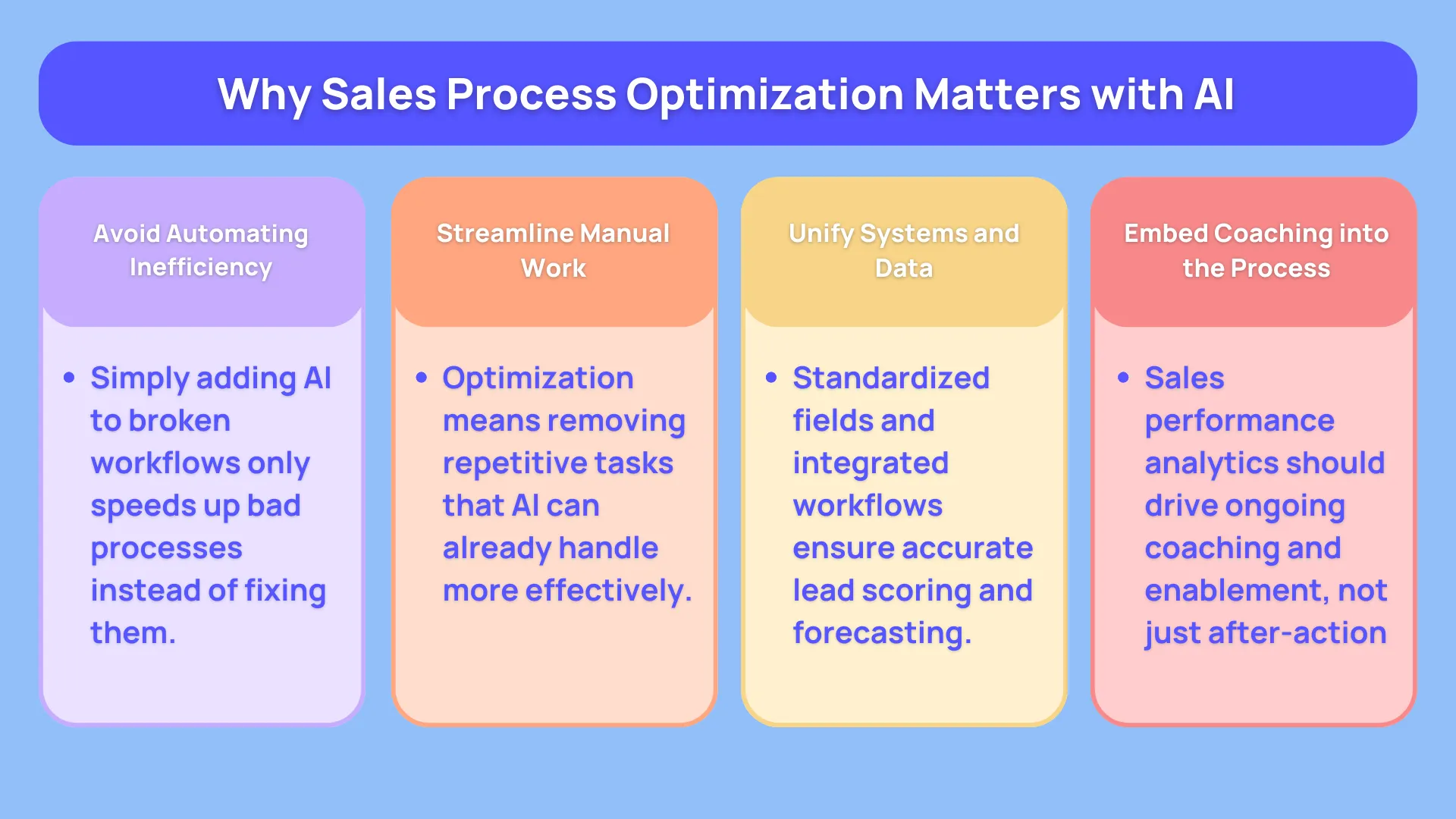
A lot of companies are excited about AI, but fall into the trap of adding it to existing workflows without rethinking those workflows. The problem is that if your process is broken, AI will only make you faster at being inefficient.
Sales process optimization is about reimagining the selling journey so AI can deliver the biggest impact. That means:
- Eliminating unnecessary manual steps that AI can already handle.
- Redesigning workflows so reps don’t have to bounce between five different systems.
- Standardizing data fields so predictive lead scoring and intelligent sales forecasting are accurate.
- Building coaching and enablement into the process with sales performance analytics, not just after the fact.
Personalized Customer Engagement Through AI
One of the most powerful promises of AI in sales is its ability to drive personalized customer engagement at scale.
Customers don’t want generic outreach anymore. They expect sellers to understand their pain points, anticipate their needs, and speak directly to their context.
Artificial intelligence makes this possible by analyzing purchase history, browsing behavior, email engagement, and even sentiment in conversations. From then on, it can recommend the right product, suggest the right timing for outreach, or generate a hyper-personalized email.
For SDRs and BDRs, it means that every conversation feels more relevant.
Meanwhile, for customers and potential prospects out there, it means that they feel understood, which increases trust and conversion rates.
Real-Time Sales Insights: A New Standard
Imagine being on a call and having live recommendations show up on your screen: a competitor your prospect is considering, a product feature you should highlight, or even a warning that the customer sounds disengaged.
This is what real-time sales insights look like in practice.
As we mentioned a bit earlier in this post, if you’re using an ai sales program that’s powered by conversational intelligence and machine learning, you’;re going to get access to different post call insights giving you and your reps a competitive edge they’ve never had before.
Machine Learning in Sales: The Engine Behind the Curtain
All of these applications—from predictive lead scoring to conversational AI—are powered by machine learning in sales. Machine learning enables systems to continuously improve by analyzing more data. For example, a predictive model that gets fed thousands of closed-won and closed-lost deals will keep sharpening its accuracy over time.
The beauty of machine learning is that it adapts as markets and customer behavior change. What worked last quarter may not work today, but the model keeps learning, ensuring that reps and leaders always have fresh insights.
To build these adaptive systems tailored to your sales process, you may need to hire machine learning developers with expertise in predictive analytics and sales AI.
The Bottom-Line Benefits of AI-Driven Sales Automation
At the heart of all these innovations is AI-driven sales automation.
Again, it depends on the tech stack you’re using.
As of right now, there are far too many software, offering integrated experiences that vary a lot. One one hand, program X might be advertising something, but it won’t work for you because of your unique business use-case, requirements and the type of workflow that comes at operational level.
The “benefits” eventually come down to the actual program that your company is using, and these areas:
- Sales process automation: Reps no longer have to waste time updating CRMs, writing repetitive emails, or handling after-call work. AI handles it.
- Boosted productivity: With admin work off their plates, reps can spend their prime hours selling instead of filling out forms.
- Improved conversion rates: Through a blend of automated digital solutions and real-time insights, AI makes sure reps are talking to the right people, at the right time, with the right message.
Landing the Full Potential of AI in Sales
AI isn’t a plug-and-play miracle. The companies seeing real results follow a few consistent pattern, where existing results are monitored after any new technology is introduced.
Changes are made accordingly. Plus, these companies also change software, adding new solutions that make the entire business efficiency scale with the passage of time. Regardless, we are looking at some of the following aspects of ai in sales from business’s point of view:
- They adopt an end-to-end view of the sales process.
- They reimagine workflows instead of simply layering AI on top of old ones.
- They start small, scaling with high-value use cases.
- They prioritize data quality, cleaning out inaccurate or outdated information.
- They run rapid tests, learn, and iterate quickly.
The Future: Agentic AI in Sales Is Already Here
Agentic AI is already here.
Instead of simply helping with prospecting or coaching, these systems are able to manage entire sales campaigns, hand off leads seamlessly, and learn continuously with minimal human input.
But the thing is, these transitions don’t happen on their own.
You need to hire people who know what they’re doing, who know what the competition is up to, and the type of tools that’ll be needed to scale your business’s efforts. Other than that, always make sure that there’s a technology champion in your company who’s able to train people on how new processes work.
If you’re not willing to make the shift, you’re looking at weaker customer engagement, low conversions, and a very long and tedious process that’ll hinder your sales efforts.



